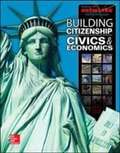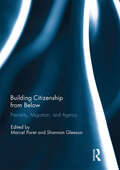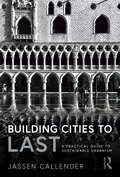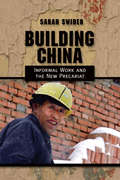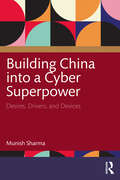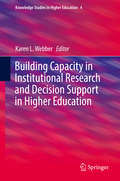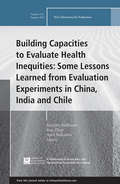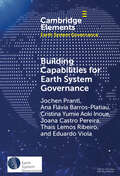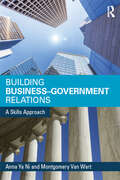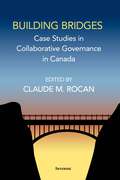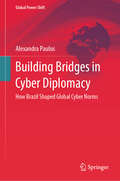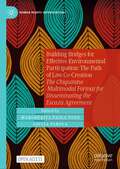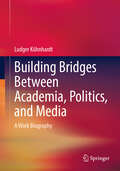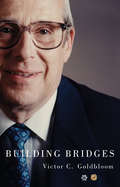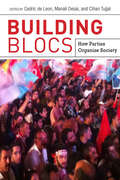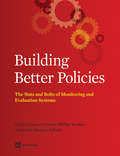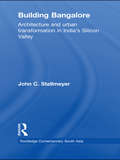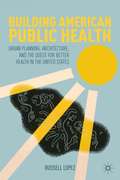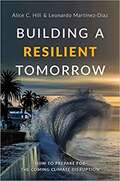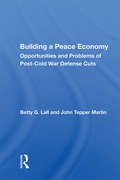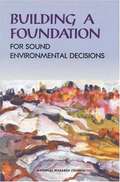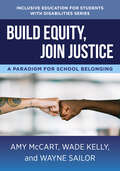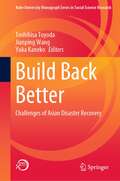- Table View
- List View
Building Citizenship: Civics & Economics
by Patrick Clayton Remy SaffellPrepare your students for citizenship in today's world with the first fully integrated print and digital learning experience for civics and economics. Focus on the Essential Questions with content built around Enduring Understanding and the National Civics and Economics Standards Make concepts real and relevant with The Story Matters chapter openers, Teen Citizens in Action, Landmark Supreme Court Cases and service learning activities Maximize comprehension with built-in reading strategies, and vocabulary support Build critical thinking skills with You Decide, Being an Active Citizen, Why It Matters, and 21st Century Skill Activities
Building Citizenship from Below: Precarity, Migration, and Agency
by Shannon Gleeson Marcel ParetFocusing on what can be referred to as the ‘precarity-agency-migration nexus’, this comprehensive volume leverages the political, economic, and social dynamics of migration to better understand both deepening inequality and popular resistance. Drawing on rich ethnographic and interview-based studies of the United States and Latin America, the authors show how migrants are navigating and challenging conditions of insecurity and structures of power. Detailed case studies illuminate collective survival strategies along the migrant trail, efforts by nannies and dairy workers in the northeast United States to assert dignity and avoid deportation, strategies of reintegration used by deportees in Guatemala and Mexico, and grassroots organizing and public protest in California. In doing so they reveal varied moments of agency without presenting an overly idyllic picture or presuming limitless potential for change. Anchoring the study of migration in the opposition between precarity and agency, the authors thus provide a new window into the continuously unfolding relationship between national borders, global capitalism, and human freedom. This book was originally published as a special issue of the journal Citizenship Studies.
Building Cities to LAST: A Practical Guide to Sustainable Urbanism
by Jassen CallenderBuilding Cities to LAST presents the myriad issues of sustainable urbanism in a clear and concise system, and supports holistic thinking about sustainable development in urban environments by providing four broad measures of urban sustainability that differ radically from other, less long-lived patterns: these are Lifecycle, Aesthetics, Scale, and Technology (LAST). This framework for understanding the relationship between these four measures and the essential types of infrastructure—grouped according to the basic human needs of Food, Shelter, Mobility, and Water—is laid out in a simple and easy-to-understand format. These broad measures and infrastructures address the city as a whole and as a recognizable pattern of human activity and, in turn, increase the ability of cities—and the human race—to LAST. This book will find wide readership particularly among students and young practitioners in architecture, urban planning, and landscape architecture.
Building China: Informal Work and the New Precariat
by Sarah SwiderRoughly 260 million workers in China have participated in a mass migration of peasants moving into the cities, and construction workers account for almost half of them. In Building China, Sarah Swider draws on her research in Beijing, Guangzhou, and Shanghai between 2004 and 2012, including living in an enclave, working on construction jobsites, and interviews with eighty-three migrants, managers, and labor contractors. This ethnography focuses on the lives, work, family, and social relations of construction workers. It adds to our understanding of China's new working class, the deepening rural-urban divide, and the growing number of undocumented migrants working outside the protection of labor laws and regulation. Swider shows how these migrants--members of the global "precariat," an emergent social force based on vulnerability, insecurity, and uncertainty--are changing China's class structure and what this means for the prospects for an independent labor movement. The workers who build and serve Chinese cities, along with those who produce goods for the world to consume, are mostly migrant workers. They, or their parents, grew up in the countryside; they are farmers who left the fields and migrated to the cities to find work. Informal workers--who represent a large segment of the emerging workforce--do not fit the traditional model of industrial wage workers. Although they have not been incorporated into the new legal framework that helps define and legitimize China's decentralized legal authoritarian regime, they have emerged as a central component of China's economic success and an important source of labor resistance.
Building China into a Cyber Superpower: Desires, Drivers, and Devices
by Munish SharmaThis book provides a comprehensive look into China’s emerging cyberspace strategy. It highlights the prime drivers of China’s desire to be a cyber superpower and discusses the ways in which China is turning resources into cyber power.The book analyses China’s domestic cyber policy initiatives, strategy documents, censorship measures, and the rationale behind its strong advocacy for sovereignty in cyberspace. It examines China’s position on the prominent issues of cyberspace governance, norms and security in cyberspace, and key diplomatic initiatives. The book also discusses next-generation networks, artificial intelligence, quantum information sciences, and cyber warfare.An important contribution to the study of China’s cyber policy, the book will be of interest to students and researchers of international relations,Chinese digitalisation, security studies, Chinese politics, international security, Chinese foreign policy, and Chinese economy. It will also be useful to the policymakers and corporate professionals engaged with China’s digital sphere.
Building Capacity in Institutional Research and Decision Support in Higher Education (Knowledge Studies in Higher Education #4)
by Karen L. WebberThis book examines the relevant roles, skills and knowledge needed to build the institutional research capacity across the higher education sector globally. The information contained herein will inform IR practitioners, senior level institution officials, and higher education scholars. With a focus on building the capacity of the IR profession, this book's primary audiences include senior leaders who wish to introduce or strengthen their understanding for effective decision support and staff members who are currently in decision support units and those who wish to serve in this capacity. However, this book also offers detail on the decision support function to higher education scholars who seek to better address how data can inform policy and planning in higher education. Through a broad discussion about the roles and skills of the practitioners, this book will also enumerate the ways in which decision support practitioners can be valued contributors in shaping the future decisions and direction of specific institutions and higher education broadly.
Building Capacities to Evaluate Health Inequities: New Directions for Evaluation, Number 154 (J-B PE Single Issue (Program) Evaluation)
by Kun Zhao Sanjeev Sridharan April NakaimaThe World Health Organization defines health inequities as differences in health outcomes that are systematic, avoidable, and unjust; and the result of poor social policies, unfair economic arrangements, and bad politics. This volume describes the role that evaluations can play in addressing health inequities. A key focus is on the types of capacities that need to be built to evaluate inequities.Bringing alive these questions around evaluation capacities are theory and practice studies from China, Chile, and India.This volume: Focuses on inequities in evaluation capacity building initiatives. Argues evaluations can be interventions themselves. Explores how evaluations can have influence in addressing inequities. Recognizes that innovations in evaluation capacity experiments are occurring in diverse countries and we have the opportunity to learn from such initiatives. This is the 154th issue in the New Directions for Evaluation series from Jossey-Bass. It is an official publication of the American Evaluation Association.
Building Capabilities for Earth System Governance (Elements in Earth System Governance)
by Jochen Prantl Ana Flávia Barros-Platiau Cristina Yumie Inoue Joana Castro Pereira Thais Lemos Ribeiro Eduardo ViolaThis Element develops a new Strategic Capabilities Framework for studying and steering complex socio-ecological systems. It is driven by the central question of what are the most essential capabilities that ought to be fostered for addressing the fundamental 21st Century environmental challenges and Earth system transformations. The author's objective is to innovate transformative ideas toward better climate and ocean governance that are of interest both to academics and policymakers in the field. Rather than investigating the design and effectiveness of institutions in governing the climate and the oceans, the authors offer an alternative approach starting from the assumption that global governance arrangements must be informed by the capabilities of the communities affected. This Element aims to offer out-of-the-box thinking about capabilities-focused and community-centered frameworks that align multi-level systems of governance with the fundamental challenges of global environmental change. This title is also available as Open Access on Cambridge Core.
Building Business-Government Relations: A Skills Approach
by Montgomery Van Wart Anna NiThis book introduces business-government relations in the institutional context of the United States from a practitioner’s perspective. It provides the historical, descriptive, and comparative accounts of the public and private sectors, the different roles government plays with business, including several conceptual models to understand the social interactions between the two sectors, and various economic policies associated with business. Business-government relations are framed into three different social economic contexts: The sociopolitical arena, in which government’s role as agent of business, interest groups, and government’s limited role as social architect, are introduced. The local economic development, in which government acts as a promoter of, partner with, and buyer from, business. The global market, where government mainly plays a role as promoter of domestic business. In the course of discussion, a set of skills, such as searching government jobs, starting a business, analyzing stakeholders, ethical reasoning, advancing a business agenda, leveraging public resources, contracting with government, interpreting global trends, doing business abroad, and leveraging international resources, are introduced and exercised.
Building Bridges: Case Studies in Collaborative Governance in Canada
by Robert Bell Gail Krantzberg M Derek Cook M Tere Mahoney Robyn Dryden M Mario Paris Mme Suzanne Gagnon Wanda Wuttunee John Noksana Jr. Anna J. HartThe case studies contained in this book show real life examples of complex problems being addressed through collaboration. The problems confronting modern society are complex and do not lend themselves to simple solutions or linear decision making. They require the involvement of many stakeholders. This is often brought about by networks, which bring together a multitude of players in the search for solutions to public policy issues. This can be challenging, as differing viewpoints and personalities, and often conflicting interests need to be acknowledged and reconciled. Yet without the involvement of all interested parties, solutions that emerge will likely be partial, distorted, and short-lived. The cases span a broad spectrum, including issues of poverty reduction, criminal gang reduction, environmental reparation, economic development for First Nations, building age-friendly communities, and co-management of fisheries.
Building Bridges in Cyber Diplomacy: How Brazil Shaped Global Cyber Norms (Global Power Shift)
by Alexandra PaulusThis book examines the international forums in which states develop cyber norms—“rules of the road” for how governments use information and communication technologies. To understand the dynamics in this emerging field of diplomacy, the book focuses on an often-overlooked actor: Brazil. With the international debate dominated by two camps that can be broadly characterized as the West versus China and Russia, the book demonstrates that Brazil holds a key position as a bridge-builder between these two sides. It paints a rich picture of Brazil’s efforts in shaping cyber norms across such diverse forums as the United Nations, BRICS, and the Organization of American States, while contextualizing these activities in Brazilian domestic cybersecurity policy and foreign policy traditions. This rich case study paves the way for a deeper understanding of how different actors shape international cybersecurity policy.
Building Bridges for Effective Environmental Participation: The Chiquitano Multimodal Format for Disseminating the Escazú Agreement (Human Rights Interventions)
by Margherita Paola Poto Giulia ParolaThis open-access book aims to explore and promote indigenous participation in legal design and visual law, with a specific focus on co-creating a visual representation of the Escazu Agreement in collaboration with the Chiquitano people. This project stands out as a unique and transformative endeavor, offering distinctive features and a range of benefits to its readers and stakeholders.
Building Bridges Between Academia, Politics, and Media: A Work Biography
by Ludger KühnhardtLudger Kühnhardt, a globally active political scientist, consultant, and publicist, provides vivid and personal insights into the people and sources that shaped him, the thought paths he has followed, and the impulses his work in research and teaching has triggered over decades. A biographical workshop report of high authenticity, bringing together what often appears unconnected in the midst of professional everyday life. Insights that were ahead of their time are repeatedly illuminated from different perspectives, and findings that have remained timelessly relevant are recalled. A vividly written work biography about the inner driving forces and external contexts of a cosmopolitan public intellectual as an enlightening and advisory catalyst in the interplay of science, politics, and journalism. The book reflects German, European, and global contemporary history from the mid-20th century to the third decade of the 21st century in a scholarly work and its classification as a testimony to political culture.
Building Bridges
by Victor C. GoldbloomA pediatrician, provincial politician, and pioneer of interfaith dialogue, Victor Goldbloom (b. 1923) has led a rich and varied life. Deeply committed to social issues, his dedication to reconciliating French and English, federalists and sovereignists, Christians and Jews, and his understanding of public health, the environment, and minority communities are unparalleled. Born in Montreal, Goldbloom received his medical degree from McGill University in 1945. A practising pediatrician for many years, he entered public life in 1962 as a governor of the College of Physicians and Surgeons of Quebec and in 1966 was elected to the Quebec Legislature. In 1970 he became the first member of Quebec's Jewish community to serve in the provincial cabinet, under Premier Robert Bourassa. A minister of the National Assembly until 1979, Goldbloom served as Quebec's first environment minster, and later as municipal affairs minister and minister responsible for the Olympics Installations Board. In the early 1990s he became Canada's Commissioner of Official Languages. In Building Bridges - a collection of personal anecdotes, media coverage of his impressive career, and transcriptions of two historic speeches - Goldbloom recounts the details of his remarkable life and lifelong commitment to Quebec and to Canada.
Building Blocs: How Parties Organize Society
by Cihan Tuğal Cedric De Leon Manali DesaiDo political parties merely represent divisions in society? Until now, scholars and other observers have generally agreed that they do. But Building Blocs argues the reverse: that some political parties in fact shape divisions as they struggle to remake the social order. Drawing on the contributors' expertise in Indonesia, India, the United States, Canada, Egypt, and Turkey, this volume demonstrates further that the success and failure of parties to politicize social differences has dramatic consequences for democratic change, economic development, and other large-scale transformations. This politicization of divisions, or "political articulation," is neither the product of a single charismatic leader nor the machinations of state power, but is instead a constant call and response between parties and would-be constituents. When articulation becomes inconsistent, as it has in Indonesia, partisan calls grow faint and the resulting vacuum creates the possibility for other forms of political expression. However, when political parties exercise their power of interpellation efficiently, they are able to silence certain interests such as those of secular constituents in Turkey. Building Blocs exposes political parties as the most influential agencies that structure social cleavages and invites further critical investigation of the related consequences.
Building Better Policies
by Keith Mackay Philipp Krause Gladys Lopez-AcevedoGovernments around the world face ongoing pressures from citizens to provide more and better services, and to do this while restraining taxation levels. This provides the context for government efforts to ensure their policies and programs are as effective, and as efficient, as possible. An emphasis on government performance has led a number of governments to create formal systems for monitoring and evaluating their performance--on a regular, planned, and systematic basis--with the objective of improving it. The focus of this book is on these government monitoring and evaluation (M and E) systems: what they comprise, how they are built and managed, and how they can be used to improve government performance.
Building Bangalore: Architecture and urban transformation in India’s Silicon Valley (Routledge Contemporary South Asia Series)
by John C. StallmeyerExamining spatial transformations in Bangalore, one of India's fastest growing cities, this book highlights the influence of information and communications technology (ICT) development on the city. Focusing on the production of urban space and the processes that inform such production, the author proposes that Silicon Valley, California has become a globalized model for the production of ICT urban development. The book presents a history of Bangalore's urban development and the emergence of the ICT industry there. Using this historical analysis and the geography of ICT development, the author identifies several case study areas where ICT development is transforming the built environment. Building on this analysis, the author goes on to suggest that the development in Bangalore over the last 20 years represents a type of informational cascade, and that the case studies illustrate that local information alters the course of ICT development and has the potential to overturn this cascade. This in turn could lead to a more sustainable urban future, one that profits from the city's regional advantages. The transformations taking place in Bangalore are occurring in many cities that are competing in the new informational economy. This book makes an important contribution to studies on South Asia as well as Architecture and Urban Studies.
Building An Effective Environmental Management Science Program: Final Assessment
by Committee on Building an Environmental Management Science ProgramThis book assesses the Department of Energy's Environmental Management Science Program--a new program that funds basic research related to environmental cleanup of the department's weapons complex. The authoring committee was established to advise the department on the structure and management of the program. The book provides recommendations on long-term challenges and opportunities for the program.
Building American Public Health
by Russell LopezThis historical study looks at how reformers have used urban planning and architecture to improve the health of urban residents of the United States. It begins in the nineteenth century, when problems in rapidly urbanizing cities threatened to overwhelm cities, and then traces the development and impact of reform movements up through the First World War, including discussions of model tenements, the 'city beautiful' movement, tenement laws, and zoning and building codes. Midcentury design movements, such as new efforts to plan suburbs and Modernism, along with outlines of the impacts of public housing, highway building, and urban renewal, are the focus of the middle chapters of the book. The final third examines the revival of cities and the reconnection of public health with urban planning that occurred as the twentieth century ended.
Building Afghanistan's Security Forces in Wartime: The Soviet Experience
by Olga OlikerSecurity force assistance is central to the counterinsurgency campaign of U.S. and coalition forces in Afghanistan. The outcome will hinge on the effectiveness of the assistance provided to the Afghan National Army, Afghan National Police, and other security forces. This report provides an overview of Soviet efforts to improve and facilitate the training and development of Afghan security forces.
Building A Resilient Tomorrow: How To Prepare For The Coming Climate Disruption
by Leonardo Martinez-Diaz Alice C. HillClimate change impacts-more heat, drought, extreme rainfall, and stronger storms-have already harmed communities around the globe. Even if the world could cut its carbon emissions to zero tomorrow, further significant global climate change is now inevitable. Although we cannot tell with certainty how much average global temperatures will rise, we do know that the warming we have experienced to date has caused significant losses, and that the failure to prepare for the consequences of further warming may prove to be staggering. Building a Resilient Tomorrow does not dwell on overhyped descriptions of apocalyptic climate scenarios, nor does it travel down well-trodden paths surrounding the politics of reducing carbon emissions. Instead, it starts with two central facts: climate impacts will continue to occur, and we can make changes now to mitigate their effects. While squarely confronting the scale of the risks we face, this pragmatic guide focuses on solutions-some gradual and some more revolutionary-currently being deployed around the globe. Each chapter presents a thematic lesson for decision-makers and engaged citizens to consider, outlining replicable successes and identifying provocative recommendations to strengthen climate resilience. Between animated discussions of ideas as wide-ranging as managed retreat from coastal hot-zones to biological approaches for resurgent climate-related disease threats, Alice Hill and Leonardo Martinez-Diaz draw on their personal experiences as senior officials in the Obama Administration to tell behind-the-scenes stories of what it really takes to advance progress on these issues. The narrative is dotted with tales of on-the-ground citizenry, from small-town mayors and bankers to generals and engineers, who are chipping away at financial disincentives and bureaucratic hurdles to prepare for life on a warmer planet. For readers exhausted by today's paralyzing debates on yearly "fluke" storms or the existence of climate change, Building a Resilient Tomorrow offers better ways to manage the risks in a warming planet, even as we work to limit global temperature rise.
Building A Peace Economy: Opportunities And Problems Of Post-cold War Defense Cuts
by Betty G. LallThis book shows how to make the smoothest possible transition to civilian use of newly released military resources, especially the physical and human resources that have been devoted to defense production and thereby help people make the required economic adjustment.
Building A Foundation For Sound Environmental Decisions
by Committee on Research Opportunities Priorities For EpaOver the past decades, environmental problems have attracted enormous attention and public concern. Many actions have been taken by the U.S. Environmental Protection Agency and others to protect human health and ecosystems from particular threats. Despite some successes, many problems remain unsolved and new ones are emerging. Increasing population and related pressures, combined with a realization of the interconnectedness and complexity of environmental systems, present new challenges to policymakers and regulators.Scientific research has played, and will continue to play, an essential part in solving environmental problems. Decisions based on incorrect or incomplete understanding of environmental systems will not achieve the greatest reduction of risk at the lowest cost.This volume describes a framework for acquiring the knowledge needed both to solve current recognized problems and to be prepared for the kinds of problems likely to emerge in the future. Many case examples are included to illustrate why some environmental control strategies have succeeded where others have fallen short and how we can do better in the future.
Build Equity, Join Justice: A Paradigm for School Belonging (The Norton Series on Inclusive Education for Students with Disabilities #0)
by Wayne Sailor Wade Kelly Amy McCartA playbook for designing schools where no student is marginalized. Educators all over the country are waking to a collective realization: The hope and compassion they have for their students is not enough to counteract the inequitable policies and practices of the school system. Students and communities who have been historically disenfranchised along lines of race and disability continue to face predictable barriers to opportunity and independence. In Build Equity, Join Justice, the authors present a new path forward that leads away from deficit-focused policies and toward strengths-based practices. The authors’ ten equity-advancing principles, based on the groundbreaking work of the SWIFT Education Center in multiple school districts, are designed to address the learning needs and social concerns of all students without requiring them or their advocates to “ask permission” to be included. Complete with practical tools and reflective activities throughout, this book empowers educators at every level to transform their schools into equity-advancing, justice-centered institutions.
Build Back Better: Challenges of Asian Disaster Recovery (Kobe University Monograph Series in Social Science Research)
by Toshihisa Toyoda Yuka Kaneko Jianping WangInternational society led by the United Nations has been working to improve and standardize every country's post-disaster recovery policy. In particular, the Sendai Framework for Disaster Risk Reduction adopted at the UN World Conference at Sendai, Japan, in 2015 declared the slogan "Build Back Better (BBB)." In this book, the BBB is considered an essential common criterion for evaluating recovery status, but BBB variations in each individual country's context are pursued. In contrast to a governmental approach to recovery evaluation focusing mainly on physical structures and macro indicators, this volume focuses more on the affected societies, communities, economies, and especially victims' livelihoods. The authors are academics from diverse fields, including governance, law, economics, and engineering, so that the book is truly interdisciplinary. This collection results from an international collaboration by scholars from "disaster-affected universities" in global-scale mega-disasters occurring in the Asian region in recent decades. The universities include Kobe University in Japan; Iwate University in Japan; Syiah Kuala University in Aceh, Indonesia; Sichuan University in China; and the University of the Philippines.
